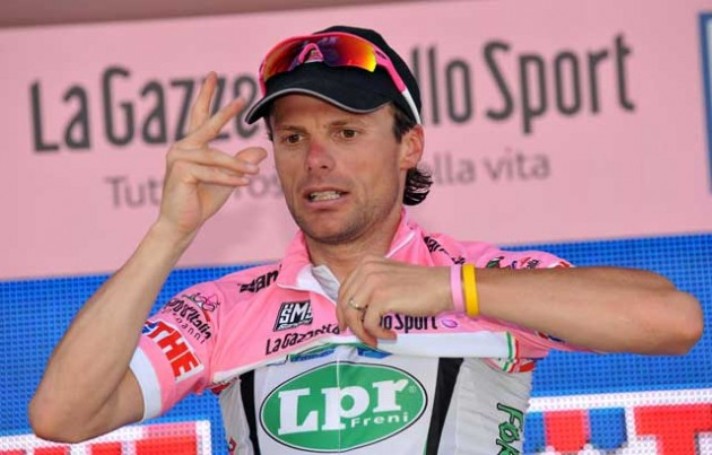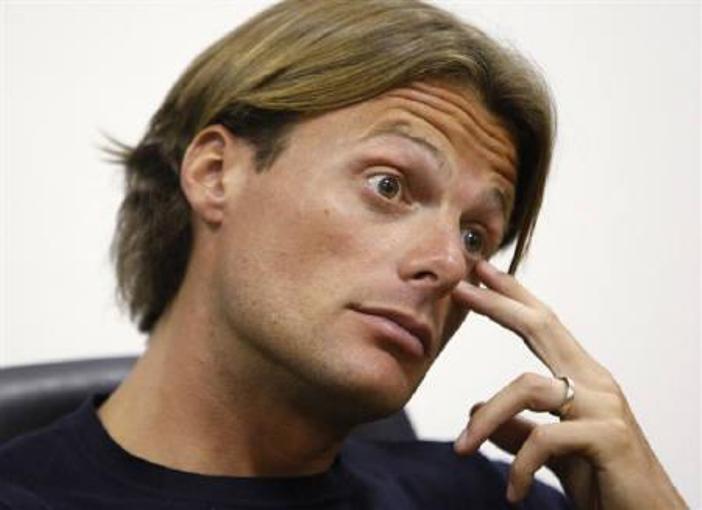
Banned for life in 2013, disgraced Giro d’Italia winner Danilo Di Luca said he “regrets nothing” from a drug-fuelled career that turned him and many other cyclists into “liars”, in an autobiography to hit the shelves Tuesday.
Di Luca won the three-week Italian race, the 99th edition of which begins Friday in the Dutch town of Apeldoorn, in 2007 but earned more notoriety than fame in his career due to persistent doping controversy.
But despite the ultimate humiliation of a life ban three years ago, Di Luca said he was simply following the professional peloton’s etiquette.
And he claims those involved in professional cycling maintain an ‘omerta’ about some of the sport‘s darker practices.
“If I hadn’t doped, I would never have won. I regret nothing. I lied, I cheated, I did what I had to do to win,” Di Luca wrote in ‘Bestie di Vittoria’ – ‘Beasts made for victory’.
Blond-haired Di Luca says in the book he began doping as an amateur in 1997 and “more seriously” in 2001, the year he claimed a career-defining win at the Tour of Lombardy one-day classic.
Having aroused suspicions as early as 2004, when he was recorded by officials talking about doping products in a wiretapped telephone call, Di Luca — then considered a one-day race specialist — aroused even more suspicion when he finished fourth overall at the 2005 Giro d’Italia.
Two years later, celebrations of his maiden triumph were overshadowed by revelations of abnormally low hormone levels, amid claims he had used a masking agent to hide banned substances.
Di Luca still owns the victory as well as six stage wins from the 2007 edition.
Weeks later, he was still leading the UCI Pro Tour series when he was implicated in an investigation into his local doctor which came to be known as the ‘Oil for Drugs’ affair, leading to a three-month ban.
Undeterred, Di Luca tried to win the Giro for a second time, in 2009, only to finish second and see his campaign end in disgrace when he tested positive on two occasions, for EPO (erythropoietin) CERA, during the race.
In 2010 the Italian Olympic Committee (CONI) hit Di Luca with a two year-ban, though it was reduced to nine months in exchange for expert doping testimony.
In 2013 he hit the headlines when he was caught cheating again on the Giro d’Italia.
While competing with the Vini Fantini team, Di Luca was informed a random test taken at his home a month earlier had revealed an adverse finding.
Sacked by his team, Di Luca was banned for life by CONI in December 2013 and ordered to pay nearly 40,000 euros in fines and costs.
Cycling claims to have taken significant steps to eradicate doping in recent years, including the introduction of a pioneering blood passport programme — although critics claim the cheats always find a way to make marginal gains on their rivals.
But in excerpts that threaten to shed light on cycling’s dark underbelly, Di Luca claims the ‘omerta’ which has traditionally held sway over the sport still operates.
“In cycling, everyone knows the truth, but this truth isn’t accepted. When team managers say, ‘I don’t know anything’, they’re lying,” added Di Luca.
“When you take illegal substances you become a liar. You lie to your family, to your wife, to the media, to your physio, to the mechanics. Even to other riders.
“All the riders know that everyone’s doping, yet no one speaks about it and some even claim to be riding on bread and water. Lying becomes just as natural as breathing,” he claimed. – Agence France-Presse






























